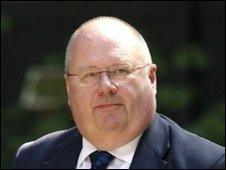Councils 'urged' to publish all spending over £500
- Published

Eric Pickles said the move will lead to greater value for money
Councils in England are being urged to publish details of spending above £500 as part of a government "revolution" in transparency.
They will not be forced by law to open their books.
The government denies this is a climbdown from the coalition agreement which said councils would be "required" to do so.
Communities Secretary Eric Pickles said it would be a "good way for councils to reflect local need".
Government sources said "measures would be taken" against councils that did not co-operate.
Mr Pickles has written to local authorities urging them to work with the Local Government Association to deliver the reforms.
He said "throwing open the council books" would open the door to new businesses and encourage greater innovation and entrepreneurship.
"The swift and simple changes we are calling for today will unleash an army of armchair auditors and quite rightly make those charged with doling out the pennies stop and think twice about whether they are getting value for money.
"Organisations that might have been effectively locked out before, including voluntary sector and small business, will be in a much stronger position to pitch for contracts and bring new ideas and solutions to the table."
He later told the BBC that "it's a good way for local authorities to be accountable to the public, it's a good way to bring down costs, and it's a good way for councils to reflect local need".
He added: "It's about being able to provide more for less, it's about being able to demonstrate how money is used, and the certainty that you're going to have to justify spending that money is going to be a big prompt to producing better local government."
At one stage, in opposition, the Conservatives were considering passing laws forcing local authorities to publish spending above £500, in return for more powers in other areas.
But the LGA, which is setting up a programme to help councils achieve greater transparency in line with ministers' aims, said legislation was "never on the table" in discussions with Mr Pickles' department.
'See and scrutinise'
An LGA spokesman said legislation forcing councils to publish financial details would fly in the face of the government's commitment to "localism".
He said he was confident most councils would comply with the plan, adding that some already published such details and others had "systems in place" making it relatively straightforward.
According to the timetable announced by Mr Pickles, by September councils will be expected to make details of spending above £500 on all goods and services available for the public to "see and scrutinise".
This would include such items as car hire, software, consultancy fees and utility bills.
The Department for Communities and Local Government says all councils "should be doing this as a matter of course by the start of next year", as well as publishing invitations to tender and final contracts on projects over £500.
The government has said it will "consult on greater disclosure of senior staff salaries by name and job descriptions".
Public spending
It is also urging "greater clarity" on councillors' expenses and for the minutes of meetings, saying what was discussed and decided, to be routinely published.
Other proposals including publishing job vacancies online, to reduce advertising costs, and publishing council tax collection rates and data about the performance of services such as rubbish collection and recycling.
A raft of other data, including pub licensing decisions, planning discussions, food hygiene reports should also be made available to the public, the DCLG says.
Some of it is already in the public domain but it should be republished in a more accessible form and made available to outside groups without charge or copyright claims, it adds.
It comes after the government published millions of public spending data in a bid to increase transparency.
- Published31 May 2010
- Published1 June 2010